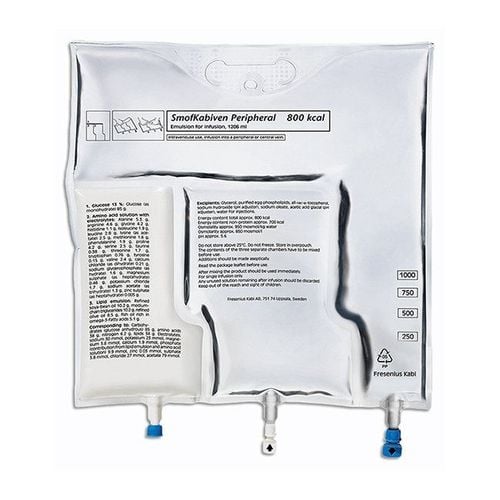This is an automatically translated article.
Omega-3 plays an essential role in the early neurological and visual development of children. Pregnant women should be provided with the recommended daily allowance, throughout pregnancy as well as while breastfeeding.1. Can pregnant women take Omega 3?
Omega-3 is understood as a long-chain polyunsaturated fatty acid that plays an important role in the early neurological and visual development of children. In terms of classification, there are many different forms of Omega-3 in which DHA and EPA play a very important role.DHA and EPA often occur together in foods used daily and work together in the body, but each fatty acid has different benefits:
EPA supports the heart, immune system and effects anti-inflammatory use. DHA supports the development of the brain, eyes and central nervous system. Many studies show that appropriate supplementation of both EPA and DHA can prevent labor and premature birth, reduce the risk of pre-eclampsia and control the weight of pregnant women, avoid dangerous complications. dangers you may encounter.
According to medical experts, whether taking fish oil or taking Omega 3 supplements during pregnancy is safe will depend on the type of fish oil you add to your body, specifically as follows:
Fish oil is taken from the flesh of fish is considered safe for pregnant women. Fish oils obtained from fish liver such as cod oil are not safe for pregnant women because they contain high levels of retinol (vitamin A), which puts the fetus at risk of various types of birth defects. When using fish marks correctly, pregnant women supplementing with Omega-3 from fish oil will bring good benefits to your pregnancy.
2. What are the effects of women taking Omega 3?
Omega-3s are unsaturated fatty acids essential for the human body. One of the most important uses of Omega 3 is its anti-inflammatory effect. In some cardiovascular diseases, arthritis is associated with an inflammatory process. Omega-3 can reduce inflammation in the human body. Therefore, Omega-3 can have a good effect in helping our body to prevent chronic diseases.Omega-3 plays a very important role for babies right from birth, specifically as follows:
Increases cognitive development: According to some studies, babies are fed formula containing formula. Diversity of Omega-3 DHA has improved hand-eye coordination. At the same time, Omega 3 also has a good effect in enhancing the ability to focus attention, social skills and intelligence scores. Studies have also shown that babies born to mothers supplemented with omega-3s (DHA, EPA) throughout pregnancy and in the early months of breastfeeding achieve better scores. higher in tests of cognitive function, specifically at the age of 4, than children whose mothers did not receive Omega-3 supplements during pregnancy. Reduced risk of asthma: In a recent study, it was found that teenagers born to mothers who were supplemented with Omega 3 were less likely to develop asthma than other children. Improves Fetal Immune System: Omega-3s have very good anti-inflammatory properties, so the immunity of babies born to mothers who have taken fish oil can be boosted to help fight diseases. conditions such as colds, allergies, flu and other immune-mediated diseases. Help the development and growth of the fetus: There is some evidence that, when adding Omega 3 to the feeding formula, there are good benefits for the physical growth as well as the development of the brain of the fetus. infants and young children. At the same time, pregnant women taking fish oil will help babies born in the future have good eye and brain development, motor coordination, and reduce the risk of low birth weight. Reduced risk of preterm birth: One study found that women who ate eggs rich in Omega-3 had fewer premature labor compared with other women. Breast milk is the ideal source of Omega-3 for babies, however the Omega-3 content in breast milk is highly dependent on their daily nutrition. Fish oil brings good benefits to the body based on two types of omega-3 fatty acids: EPA (eicosapentaenoic acid) and DHA (docosahexaenoic acid). In particular, DHA is an important structural component of the brain and eyes, playing a particularly important role in fetal brain and retina development.
3. How to supplement Omega 3 for pregnant women effectively
Omega-3 (DHA, EPA) has an important and necessary role, but the human body cannot produce it on its own and must be obtained from the daily diet or from supplements.
In the natural environment, some foods rich in DHA, EPA are:
Cold water fish including tuna, salmon, sardines, anchovies and herring. Fish is a rich and very good source of Omega-3 (DHA, EPA). Some plants also contain Omega-3 components such as flax seeds, chia seeds... However, it is important to understand that these foods contain short-chain Omega-3 which is ALA (alpha-linolenic acid) not EPA and DHA; The human body has the ability to convert ALA into EPA and DHA, but the conversion is not really easy and the conversion rate is not really efficient. However, young children and women who are breastfeeding or pregnant women need to be very careful when using products containing Omega-3. This is because toxins accumulate in some types of seafood such as: sharks, swordfish and fighting fish. You should eat smaller fish like salmon, but eat no more than 340 grams per week.
In the absence of food sources rich in Omega-3, you can use additional Omega-3 supplements. Many other foods can also be fortified with Omega-3s, such as some dairy products, breads, eggs, juices, cooking oils and snack foods.
4. Guide to choose Omega 3 for pregnant women
On the market, there are many different products that provide Omega-3. When supplementing with Omega-3 with drugs or supplements, it is necessary to consult a professional doctor. Omega-3 supplements are generally safe for most people, but caution should be exercised in people with bleeding disorders such as those taking the anticoagulant coumadin, etc. This is due to the ingredients. Omega-3s can increase blood clotting disorders.
In addition to supplementing with Omega 3, pregnant women and lactating women should pay attention to fully and comprehensively supplement other important nutrients such as: Iron, folic acid, calcium, Iodine, vitamins... and many other minerals.
Please dial HOTLINE for more information or register for an appointment HERE. Download MyVinmec app to make appointments faster and to manage your bookings easily.













